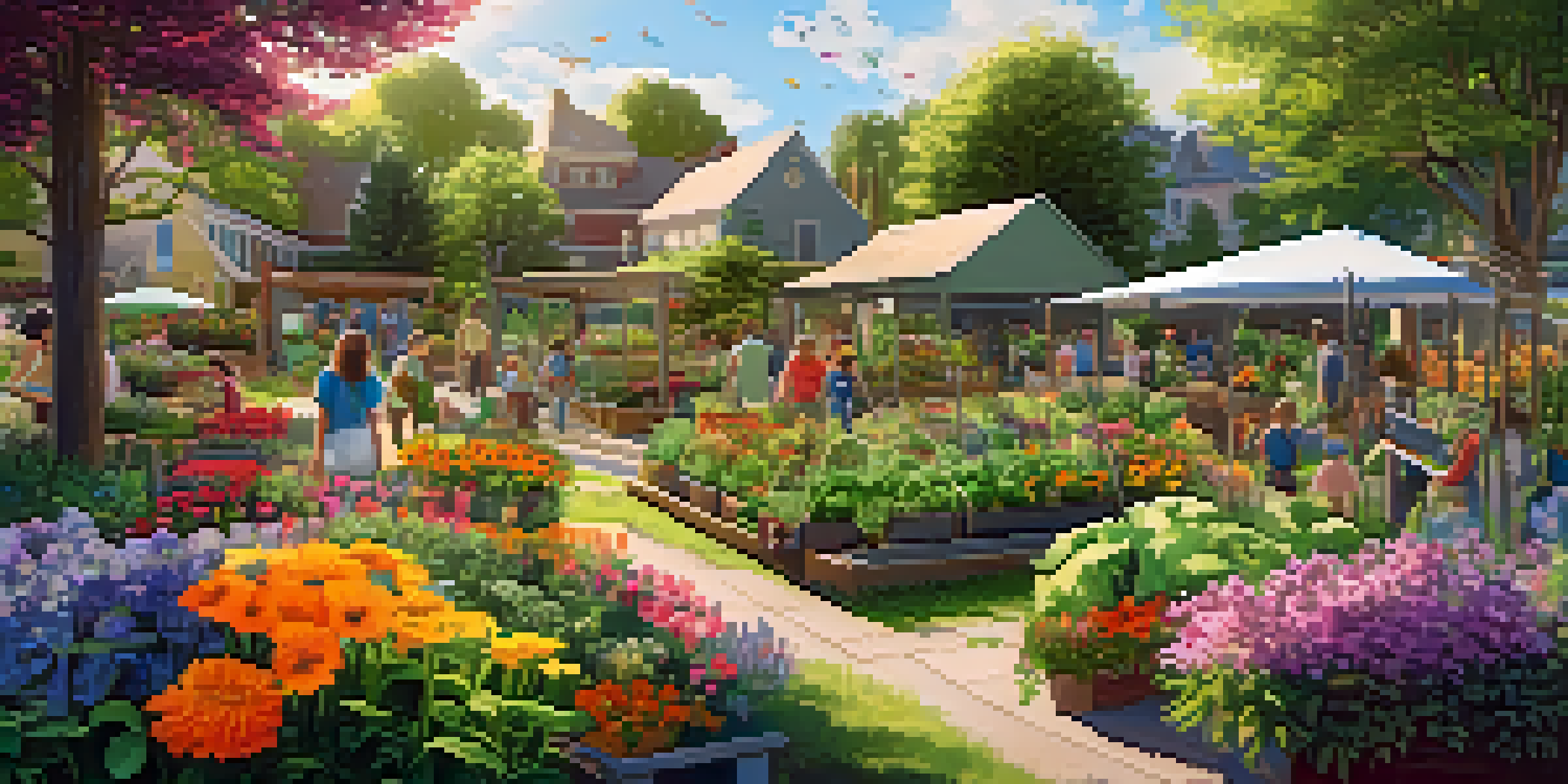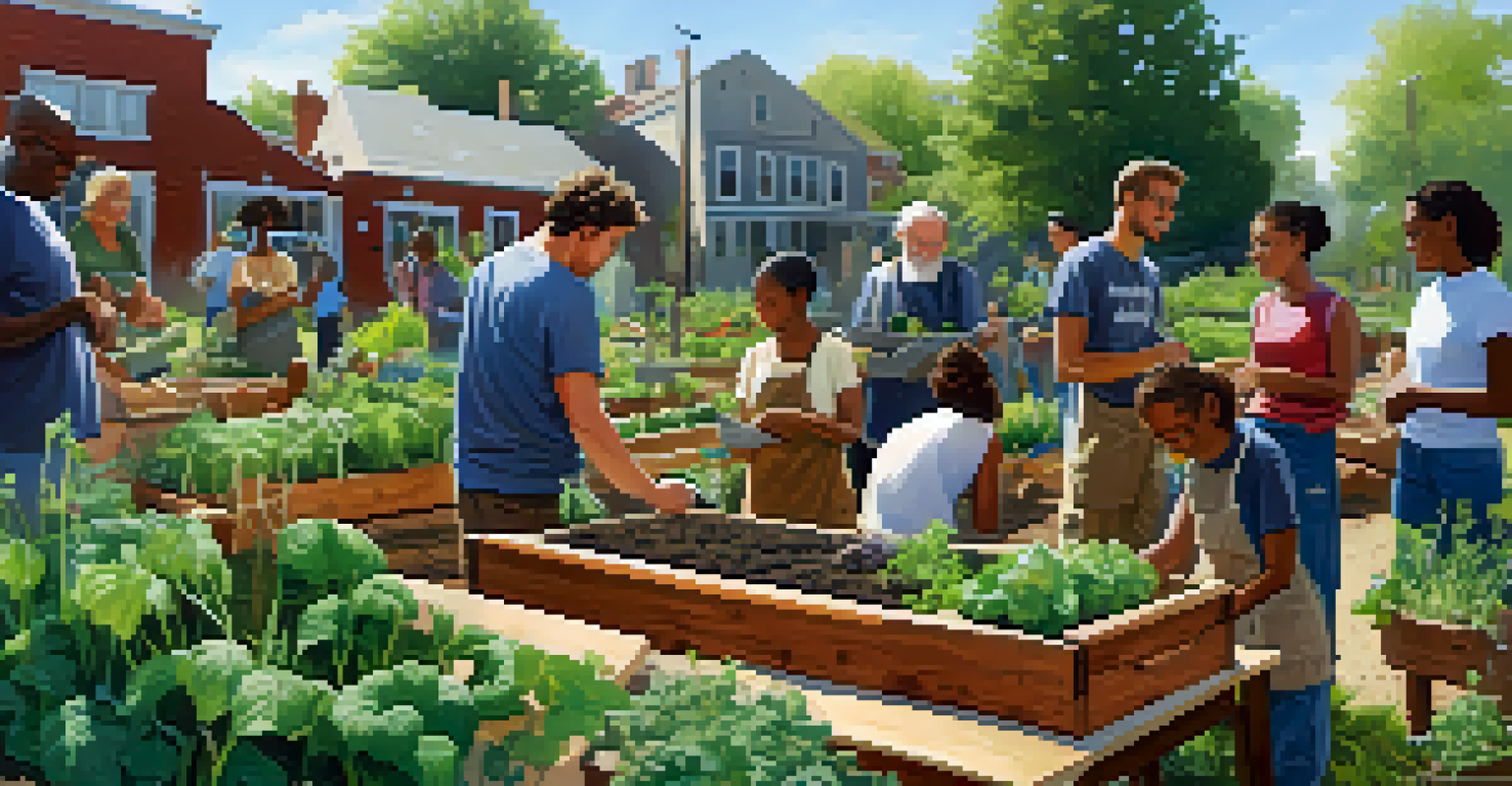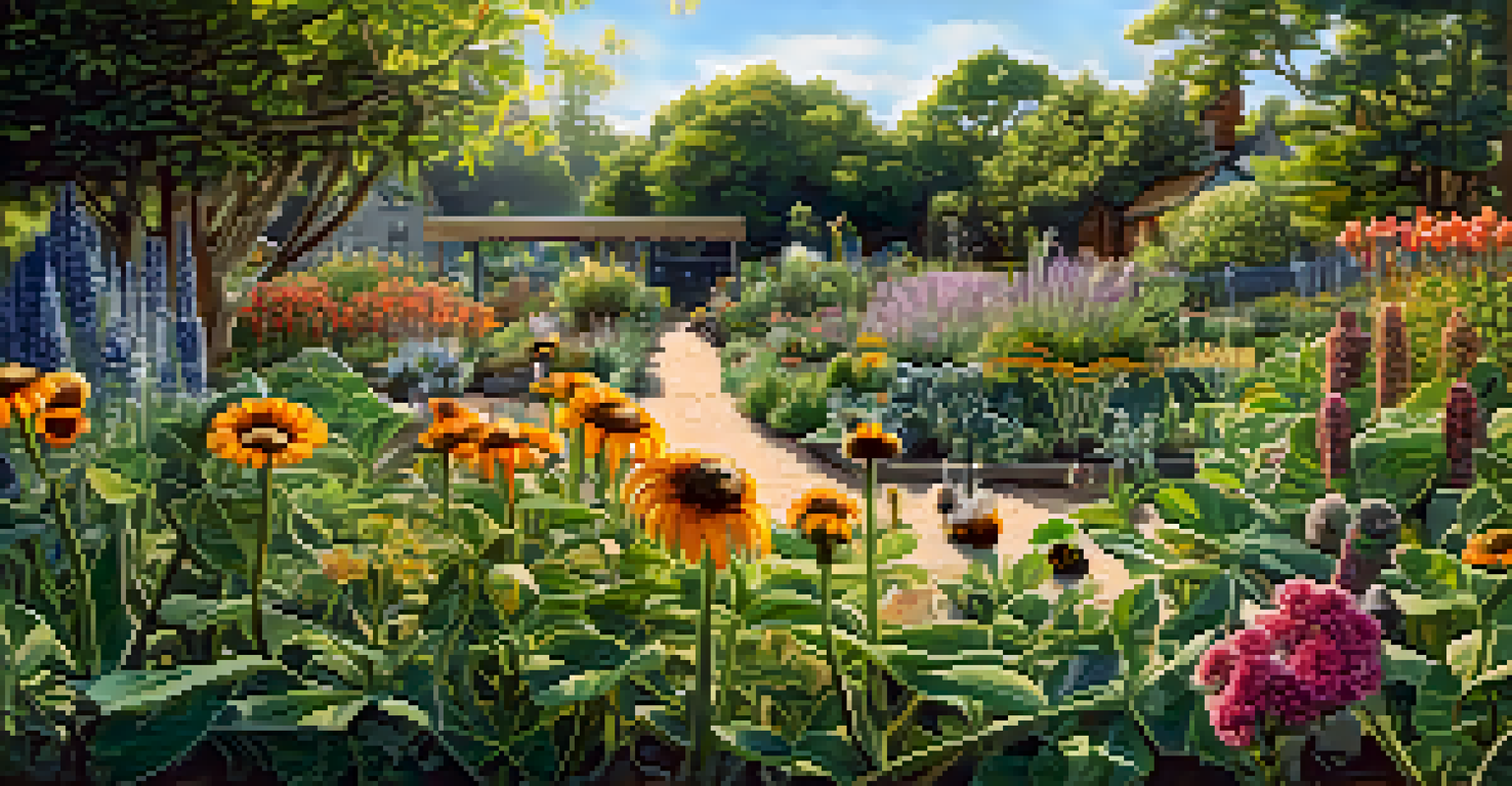The Role of Community Gardening in Climate Resilience and Health

Understanding Community Gardening and Its Importance
Community gardening is more than just planting flowers and vegetables; it's about cultivating connections. These gardens bring neighbors together, fostering a sense of belonging and cooperation. They serve as green oases in urban environments, enhancing biodiversity and providing fresh produce for local residents.
The best time to plant a tree was twenty years ago. The second best time is now.
By engaging in community gardening, individuals can learn about sustainable practices, such as composting and crop rotation, which contribute to healthier ecosystems. It's a hands-on way to understand where food comes from and the effort involved in growing it. This knowledge empowers communities to make better dietary choices and promotes food security.
Moreover, community gardens can act as vital resources during climate crises. They provide a local source of food that reduces reliance on transportation, thereby lowering carbon emissions. In times of extreme weather, these gardens can also help absorb rainwater and reduce flooding, showcasing their multifaceted benefits.
The Link Between Gardening and Mental Health
Gardening has long been associated with improved mental health outcomes, and community gardening amplifies these benefits. Engaging with nature has been shown to reduce stress, anxiety, and depression. The act of nurturing plants can foster a sense of purpose and fulfillment, which is essential for mental well-being.

Additionally, community gardens create social networks that combat loneliness. Working alongside others in the garden encourages friendships and support systems, which are critical for emotional health. These social interactions can lead to a sense of community pride and belonging, further enhancing mental wellness.
Community Gardens Foster Connection
These gardens cultivate relationships among neighbors, creating a sense of belonging and cooperation.
Research suggests that spending time in green spaces can increase feelings of happiness and life satisfaction. Community gardening, therefore, not only provides a productive outlet but also contributes to a healthier, happier population. It's a simple yet powerful way to nurture our minds as we nurture the earth.
Enhancing Food Security Through Community Gardens
Food insecurity is a pressing issue in many communities, but community gardens can be part of the solution. By growing their own fruits and vegetables, residents can access fresh produce, often at little to no cost. This self-sufficiency is crucial, especially in urban areas where healthy food options may be limited.
Gardening adds years to your life and life to your years.
Moreover, community gardens can serve as educational platforms, teaching individuals about nutrition and cooking with fresh ingredients. Workshops and cooking classes can be organized, empowering participants to make healthier food choices. This knowledge not only benefits individuals but also spreads throughout the community.
In times of economic hardship, community gardens can provide a safety net. They allow families to supplement their diets without the financial burden of grocery shopping. This empowerment through gardening can help mitigate the impacts of food deserts and improve overall community health.
Building Climate Resilience Through Local Food Systems
As climate change continues to pose challenges to food production, community gardening plays a crucial role in building resilience. Local food systems reduce the distance food travels from farm to table, which is essential during climate-related disruptions. By relying on locally grown produce, communities can better withstand supply chain interruptions.
Community gardens can also adapt to changing climate conditions by experimenting with diverse crops. This biodiversity can enhance soil health and provide a buffer against pests and diseases. Growing a variety of plants not only supports a more resilient food system but also encourages ecological balance.
Gardening Boosts Mental Health
Engaging in community gardening helps reduce stress and anxiety while promoting social interactions that enhance emotional well-being.
Furthermore, community gardens can serve as a model for sustainable agricultural practices, inspiring others to adopt environmentally friendly farming techniques. They demonstrate that local, small-scale efforts can make a significant impact on climate resilience and food security. In this way, community gardens become both a refuge and a resource for adapting to our changing world.
Fostering Biodiversity Through Community Gardening
Biodiversity is crucial for a healthy ecosystem, and community gardens contribute significantly to this diversity. By planting a variety of species, these gardens create habitats for pollinators like bees and butterflies. This not only helps the garden flourish but also supports local wildlife and promotes ecological health.
Community gardens often incorporate native plants, which are better adapted to local climates and require less maintenance. These plants attract beneficial insects and improve soil health, creating a thriving environment for all garden inhabitants. By prioritizing biodiversity, community gardens play a vital role in preserving local ecosystems.
Additionally, the knowledge gained from community gardening can inspire individuals to adopt sustainable practices in their own gardens. This ripple effect can lead to greater awareness and appreciation for biodiversity in urban settings. A thriving community garden, therefore, becomes a catalyst for environmental stewardship and a model for sustainable living.
Encouraging Youth Engagement in Gardening
Community gardens are fantastic venues for engaging young people in gardening and environmental stewardship. They offer hands-on learning experiences that teach children and teenagers about nature, nutrition, and responsibility. By getting their hands dirty, youth can develop a deeper connection to the food they eat and the environment around them.
Gardening programs can be integrated into school curriculums or organized as after-school activities. These programs not only foster an appreciation for healthy eating but also encourage teamwork and leadership skills. Engaging youth in gardening cultivates a sense of ownership over their food sources and promotes lifelong healthy habits.
Enhancing Food Security Locally
Community gardens provide access to fresh produce, empowering residents to combat food insecurity and improve their diets.
Moreover, involving youth in community gardening can strengthen intergenerational bonds. Older community members can share their gardening wisdom, creating mentorship opportunities that enrich the experience for both parties. This collaboration nurtures a sense of community while empowering the next generation of environmental stewards.
The Future of Community Gardening and Its Impact
As we look to the future, the importance of community gardening will only continue to grow. With the increasing challenges posed by climate change and food insecurity, these gardens provide a vital solution that promotes sustainability and health. Their role in fostering community resilience cannot be overstated.
Innovations in gardening techniques, such as vertical farming or hydroponics, are being explored within community settings. These advancements can help maximize space and resources, making gardening accessible to even more people. The future of community gardening is filled with possibilities that can further enhance its impact on communities.

Ultimately, community gardens represent a holistic approach to addressing the interconnected issues of health, environmental sustainability, and social cohesion. By investing in these green spaces, we invest in the well-being of our communities and the planet. The future is bright for community gardening, and its benefits will resonate for generations to come.